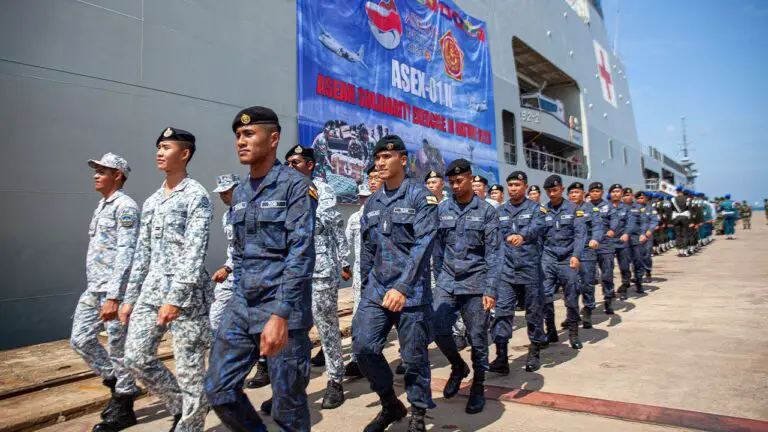ASEAN Nations Unite in Joint Naval Exercise Amid Rising Chinese Assertiveness
The Association of Southeast Asian Nations (ASEAN) embarked on its first-ever joint naval exercise this Tuesday, marking a crucial moment as several member countries respond to growing Chinese assertiveness in the region.
The exercise, known as the ASEAN Solidarity Exercise, focuses on non-combat drills, including joint maritime patrols, search and rescue operations, as well as humanitarian and disaster relief efforts, as explained by Indonesian military chief Adm. Yudo Margono.
Taking place over five days in Indonesia’s Natuna waters, the primary goal is to strengthen military ties among ASEAN nations and enhance their ability to work together. This event also involves civilian groups dedicated to humanitarian relief and disaster prevention.
While ASEAN countries have previously participated in naval exercises with other nations, including the United States and China, these drills are unique, being the first to involve only ASEAN member states. Many observers interpret this as a clear signal to China.
China’s “nine-dash line” claim, which asserts control over most of the South China Sea, has led to confrontations with other claimants such as Vietnam, Malaysia, Brunei, and the Philippines. Chinese fishing boats and military vessels have grown increasingly assertive in disputed waters.
This territorial claim also overlaps with Indonesia’s exclusive economic zone extending from the Natuna Islands. Initially scheduled for the North Natuna Sea, Indonesia, currently holding ASEAN’s rotating chair, decided to relocate the drills to the South Natuna Islands to avoid potential reactions from Beijing.
In 2002, China and ASEAN signed a non-binding accord urging nations to avoid aggressive actions that could lead to armed conflicts. Unfortunately, violations of this agreement have continued.
China has faced international criticism for its militarization of the South China Sea, justifying its actions as defense of its territories. Adm. Margono stressed that activities in the area must not violate state territory, as outlined in the United Nations Convention on the Law of the Sea.
When questioned about whether ASEAN was conveying a stronger message against China’s territorial claims, Adm. Margono asserted, “We have had a firm stance.”
He further mentioned that ASEAN has agreed to conduct annual military exercises, with plans to expand them into comprehensive war drills involving the army, navy, and air force.
While Indonesia and China maintain generally positive relations, Jakarta has expressed concerns about what it views as Chinese encroachments in its exclusive economic zone within the South China Sea. Heightened activities by Chinese coast guard vessels and fishing boats in the region have prompted Jakarta’s navy to conduct large-scale drills.
Despite officially being a non-claimant state in the South China Sea, Indonesia renamed part of it as the North Natuna Sea in 2017 to assert its exclusive economic zone claim. Similarly, the Philippines designated part of its territorial waters as the West Philippine Sea.
Vietnam, one of the four ASEAN claimants, has voiced concerns over China’s transformation of seven disputed reefs into man-made islands equipped with weapons systems. In contrast, two ASEAN members, Cambodia and Laos, both allies of China, have opposed strong language against Beijing in the disputes.

